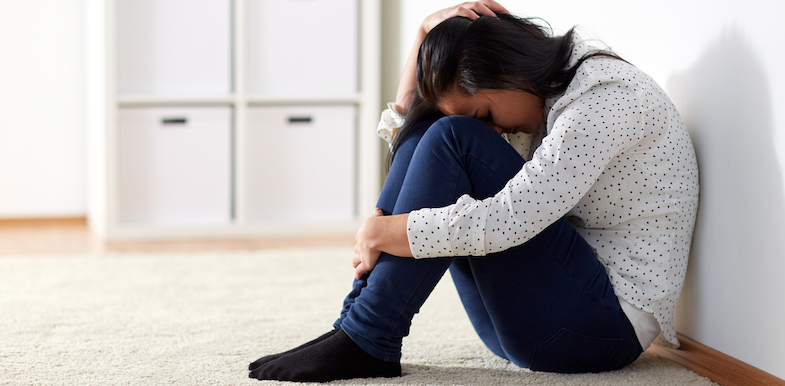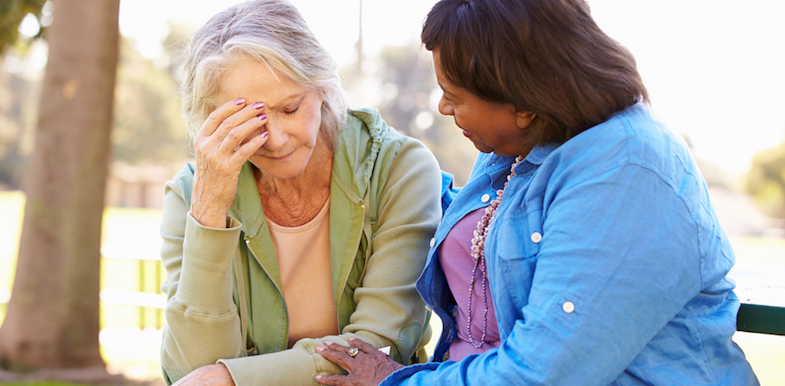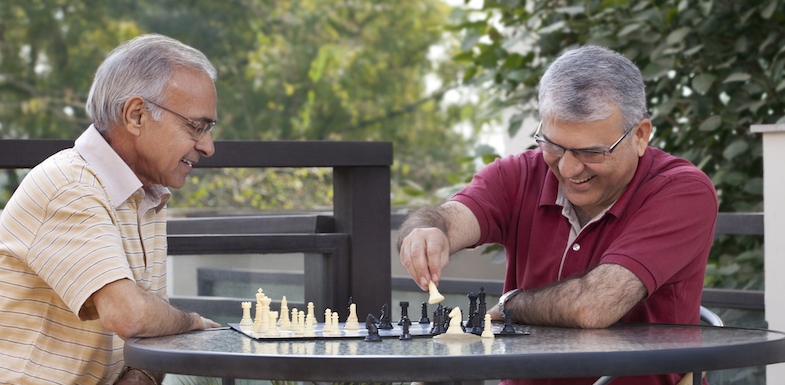
It’s one thing to be faced with the daily struggles of chronic pain. Simple things like tying your shoes or walking down a flight of stairs are hard enough. But what happens when your struggles go beyond daily physical pain? Chronic pain and loneliness amplify each other—your pain isolates you, and that isolation increases your pain
At Arizona Pain, we’re here to help. You don’t have to suffer alone. Knowing how to cope with chronic pain and loneliness can help relieve both and keep you connected to the people you love.
Understanding chronic pain and loneliness
While chronic pain is beginning to gain more widespread awareness and understanding, it is still typically an “invisible illness” with many devastating side effects.
Chronic illness and loneliness are peas in a pod, unfortunately, for a few reasons. We understand many of these and talk to our patients honestly and openly about the challenges of chronic pain, so we can move towards healing. We have some suggestions later in this post for ways to cope with chronic pain and loneliness.
The pain often has no end in sight
When we sustain an acute injury like a broken bone, we may have to sit in our homes in a cast for a few weeks while it heals. Chronic pain is not as finite.
Many experience a lifetime of unrelieved pain. When you are not surrounded by people with this experience, chronic pain can lead to loneliness and isolation.
Pain makes us turn inward
People in chronic pain often report feeling trapped by their body or unable to reach out for help. These inward-turning feelings can increase social isolation and loneliness.
Many people who suffer from chronic pain find it very difficult to explain their feelings to those who do not suffer and may shut down even further. It’s a vicious cycle.
Your old self feels lost
Chronic pain can dramatically change your life.
Things we once took for granted no longer come easily and may disappear entirely. One day you are running marathons, and the next you can barely walk downstairs for breakfast. Struggling to figure out who you are in the face of this loss can feel impossible.
Constant pain creates constant stress
When your body and mind are dealing with constant pain, both respond to this stress in physical and psychological ways. Murray J. McAllister, executive director of the Institute for Chronic Pain points out that losing a sense of direction and feeling stuck are both stressful side effects of chronic pain:
“These stressors can make pain worse because stress affects the nervous system. It makes the nervous system more reactive and you become ‘nervous.’ Chronic pain causes stressful problems, which, in turn, cause stress that makes the pain worse.”
Guilt can be overwhelming
One of the hardest parts of chronic pain is the tremendous guilt. Sure, you feel badly because you cannot participate in your old life, but what happens when you miss your children’s birthdays? Graduations? How about when a partner wants to take a vacation and you just cannot do it?
The guilt can be overwhelming, sending you into a spiral of chronic pain and loneliness. It feels like no matter how much your kids, friends, and family say they understand, it’s impossible to know for sure.
Chronic pain…it’s boring
Let’s face it: you can only watch so much TV, read so many books, and knit so many sweaters (if your hands can take it). Chronic pain places physical limits on so many things that you cannot help but be, at times, overwhelmingly bored. Chronic pain and boredom are aspects that aren’t discussed much, mostly because many people who don’t have chronic illness think they would love the opportunity to just “lie around all day.” But, you know better.
Compounding all of the factors above is the extraordinary period of social distancing brought about by the COVID-19 pandemic. Even for people who normally have good strategies in place for coping with chronic pain and isolation, social distancing requirements have forced everyone to keep a safe distance from each other.
And if you have chronic pain and another health condition that makes you more vulnerable to COVID-19 infection? It’s nearly impossible to get a healthy dose of human contact under COVID-19 safety guidelines.

What are the effects of chronic pain and social isolation?
Research on the subject of chronic pain and social isolation is definitive. Human beings are social creatures and require the stability and comfort of regular human interaction. Without it, there are very real consequences that go well beyond simply being sad or wishing you had more friends.
- Loneliness causes more rapid deterioration, especially in older adults
- The level of social isolation predicts the level of pain
- Chronic pain and loneliness seem to have a bi-directional relationship
- Social isolation can also provoke a reaction that mimics the pain response
- Loneliness and social isolation predict higher levels of pain, depression, and fatigue
- The lonelier you are, the more pain and negative feelings you might experience
Pain is individually experienced, but we are social creatures. It’s clear that when pain forces us into isolation, we suffer. At Arizona Pain, we’re here to help as much as we can.
How to cope with chronic pain and loneliness
Coping with chronic pain and loneliness is an ongoing process. Fortunately, there are many different ways to ease your isolation and feel more connected.
Share this post with others
Part of our intent with this post is to make you feel heard. Chronic pain and loneliness are the reality for many patients, with research that backs it up. Use this post as a jumping-off point to talk openly and honestly with your loved ones about how you feel, and ways they can better support you.
The opposite of loneliness is intimacy and vulnerability with others. Through deeper conversations about the challenges you’re facing, we hope you can create connections to find more support.
Bring people to you
Many people find that one of the most challenging parts of chronic pain and loneliness is being separated from people and celebrations. As Amanda notes in a recent creakyjoints.org post, she has come up with a unique solution: planning what she calls a “girl’s night in.” These small, low-key gatherings allow her to control the food, the setting, and the timing.
You need not plan elaborate celebrations with 20 guests. A simple afternoon visit, scheduled regularly, can go a long way towards re-connecting without overwhelming or causing rebound pain that occurs after overexertion. Can’t meet in person? Plan a Zoom call to catch-up.
Embrace alternative connections
In the same post, Justin K. in Hawaii notes his unique solution to being homebound with arthritis: online multiplayer videogames. He explains:
“I play every day with people all over the world and while we play, we talk. They’re like brothers to me now. If I don’t show up one day, they’ll call. If I have a doctor’s appointment, they ask about it. I know I have people who care about me.”
The online gaming community can be an incredibly supportive place for people all over the world who suffer from social isolation and loneliness. It can also help relieve some of the boredom of chronic pain. What other communities can you find, based around your interests?

Use humor
Yes, it can be hard to find anything funny when your body has seized control and your muscles are contorted with pain. But there is good evidence that humor therapy decreases feelings of loneliness of isolation and increases happiness and satisfaction with life, even when pain persists.
Try to find books, streaming comedy specials, or funny friends to bring some lightness and laughter to your days. Or, find comedians who also live with disabilities or chronic illnesses, like Maysoon Zayid or Samantha Irby, to shine a funny and understanding light on daily challenges.
Meditation
When this suggestion for coping with chronic pain comes up, many patients bristle. Pain may originate in the mind, but it is certainly felt in the body, and meditation can help remove the “story” of the pain. Instead of thinking thoughts like, “I am alone in my pain and always will be,” meditation helps replace that story with, “This pain is here and it is hard, but it will pass,” or “My friends and family may not know exactly what I am going through, but they love me and will do what they can.”
Chronic pain can negatively impact your metal health, but mindfulness meditation is one way to take more control. Start with a few minutes of breathing and gradually increase it so it becomes a regular part of your day. There are many different meditation programs (free or nearly so) to guide you.
Turn to online therapy
Online therapy is a great way to receive counseling, support, and coping strategies when chronic illness and loneliness make it difficult (or dangerous) to go out.
There are high-quality, affordable options for online therapy that can ease your mind and soften the day’s sharp edges.
Find more support online
On those days when even getting out of bed is too much, you can still get relief from chronic pain and loneliness.
Online support groups, like those found on Facebook, are filled with people who understand what you’re going through. Sometimes just knowing that others share your feelings of chronic pain and isolation can help get you through the worst of days.
Practice gratitude
This might be one of the hardest suggestions for coping with chronic pain and loneliness, but it can become of the most effective.
Studies have shown that people who have a regular gratitude practice report less pain and feel less lonely. Simply put, the more grateful you are, the less you will be impacted by your pain. This can be simple. At the beginning of your day, keep a small journal and note what you’re grateful for in your life and relationships. Or, make it easy with a gratitude app.
Consider getting a pet
Pets can bring immeasurable comfort to our lives, and bring us contact on our hardest days. If you have the ability to responsibly care for a pet, bringing one into your home can take away the loneliness. One writer notes:
“I often find myself having conversations with my dog. He just sits there and listens. If I happen to be crying, he licks the tears off my face. It seems he’s always there for me no matter what. Truly my best friend. Even if I don’t speak the words, he seems to know when I need him the most.”
And, whenever possible, adopt a rescue pet!

Get out when you can…carefully
You know those days, the ones where you wake up, and you can tell the pain is a little bit less? The ones where getting dressed doesn’t require long periods of rest between pants and shirt, and you actually can make your kids some breakfast?
These are the days, no matter how often they occur, to get out and be with people. Some folks fill this time with errands and cleaning but consider taking more time to connect with people you have been missing. Whether it’s over a stroll through the park or a picnic, use this time to catch up and to reestablish your connections. The errands can wait, and no one ever goes to their grave wishing they had done more laundry.
Be mindful of overdoing it, though. Rebound pain can make you regret the time spent out in the world. Move slowly, and cherish the quality of time you spend with loved ones.
Chronic pain goes beyond the body
Chronic pain is not just about where it physically hurts. It comes with significant anxiety, depression, and feelings of loneliness and isolation. You might be feeling low in spirit and drained physically and emotionally.
But you are not alone.
Chronic pain and loneliness do not have to be a life sentence. Arizona Pain understands the complicated challenges of chronic illness, and we want to help you get your life back. If you are struggling to make sense of your pain and feeling isolated, reach out. Our team develops customized pain management plans for every patient so we can help you get your life back, focusing on treatments for both mental and physical health.
Get in touch today to see how we can help.